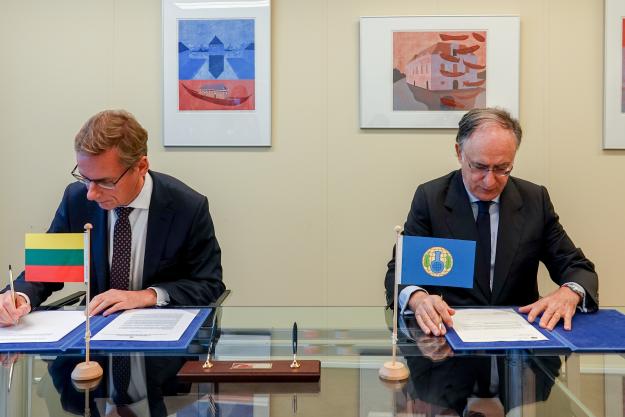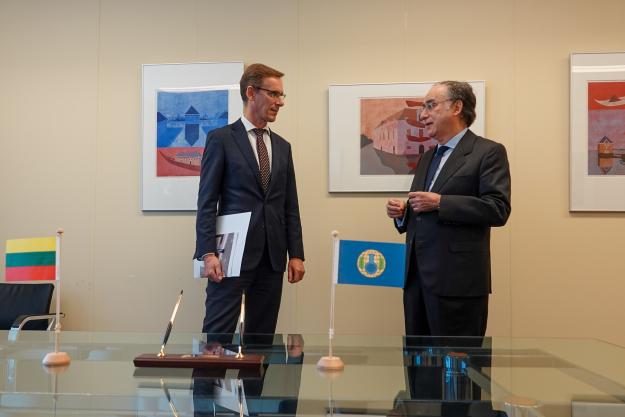
H.E. Ambassador Vidmantas Purlys, Permanent Representative of Lithuania to the OPCW and H.E. Mr Fernando Arias, OPCW Director-General
THE HAGUE, Netherlands–13 October 2020–The Government of Lithuania has contributed €10,000 to a special Organisation for the Prohibition of Chemical Weapons (OPCW) Trust Fund to support the project to upgrade the current OPCW Laboratory and Equipment Store. This project will result in the construction of a new facility, the OPCW Centre for Chemistry and Technology (“ChemTech Centre”).
The contribution was formalised during a ceremony between the Permanent Representative of Lithuania to the OPCW, H.E. Ambassador Vidmantas Purlys, and OPCW Director-General, H.E. Mr Fernando Arias, which was held yesterday at OPCW Headquarters in The Hague.
Ambassador Purlys remarked: “Lithuania regards OPCW as a very important multilateral organisation for advancing international disarmament and upholding security. The work of the OPCW brought about the elimination of almost an entire category of weapons of mass destruction. However, there are many challenges and new threats that the international community is facing in relation to chemical weapons. Unfortunately, over the last several years we have seen chemical weapons being used in Syria, the United Kingdom, Russia and other countries. There are threats of chemical terrorism and the use of sophisticated toxic chemicals as weapons. We need to make sure that the OPCW is well-equipped to meet the challenges of the future. We consider the Centre for Chemistry and Technology a flagship project in this regard. Therefore, the Lithuanian Government has decided to make a voluntary contribution to the establishment of the ChemTech Centre.”

H.E. Ambassador Vidmantas Purlys, Permanent Representative of Lithuania to the OPCW and H.E. Mr Fernando Arias, OPCW Director-General
The Director-General stated: “I commend Lithuania’s support for the ChemTech project. Such voluntary contributions are essential to the completion of this major endeavour that will advance our shared goal of maintaining and reinforcing the global ban on chemical weapons.”
Director-General Arias appealed to all OPCW Member States in a position to make voluntary contributions to do so. He further emphasised the important role the new ChemTech Centre will play in strengthening the OPCW’s ability to address chemical weapon threats and enhance capacity building activities. He highlighted that “all contributions, regardless of size, are greatly appreciated”.
So far, 45 countries, the European Union, and three other donors have contributed or pledged to contribute financially to the ChemTech Centre project, and a considerable amount has been raised to date.
Background
The project to build the ChemTech Centre is on-going and seeks to strengthen the OPCW’s capabilities to fully address new and emerging chemical weapons threats, as well as to support capacity building in OPCW Member States. The current OPCW Laboratory and Equipment Store are central to the effectiveness and integrity of the verification regime of the Chemical Weapons Convention, and they also contribute to the OPCW’s capacity-building and international cooperation activities. However, the current facility will soon no longer be fit-for-purpose due to its ageing infrastructure, space constraints, larger workloads, and new missions with new areas of work.
A new facility is required to meet the demands of OPCW Member States for enhanced verification tools, improved detection capabilities and response measures, as well as increased capacity-building activities. The ChemTech Centre will also help the OPCW to keep pace with developments in science and technology and new chemical weapons threats. The OPCW Technical Secretariat is developing a detailed project plan for the construction of the ChemTech Centre, and a Trust Fund for voluntary contributions has been established to secure the required resources for the project.
To date, the following Member States have contributed or pledged to contribute to the project: Algeria, Andorra, Angola, Australia, Bangladesh, Belgium, Canada, Chile, China, Cyprus, Czech Republic, Estonia, Finland, France, Germany, Greece, Hungary, Indonesia, Ireland, Italy, Japan, Kazakhstan, Lithuania, Luxembourg, Malaysia, Morocco, the Netherlands, New Zealand, Pakistan, Peru, Poland, Portugal, the Republic of Korea, Romania, Slovakia, Slovenia, Spain, Sweden, Switzerland, Thailand, Turkey, United Arab Emirates, United Kingdom of Great Britain and Northern Ireland, and the United States of America. The European Union, Israel and other donors have also contributed.
As the implementing body for the Chemical Weapons Convention, the OPCW, with its 193 Member States, oversees the global endeavour to permanently eliminate chemical weapons. Since the Convention’s entry into force in 1997, it is the most successful disarmament treaty eliminating an entire class of weapons of mass destruction.
Over 98% of all declared chemical weapon stockpiles have been destroyed under OPCW verification. For its extensive efforts in eliminating chemical weapons, the OPCW received the 2013 Nobel Peace Prize.
